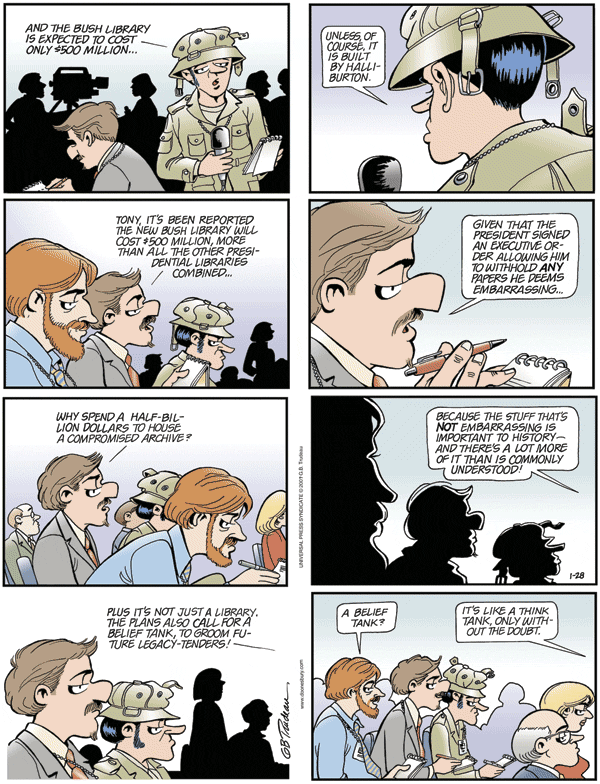Tuesday, January 30, 2007
NYT: Et Tu, George?

Et Tu, George?
Maybe George W. Bush is the education president after all. Whatever one thinks of his No Child Left Behind initiative, he has made the classics powerfully resonant today.
So for those schoolchildren and university students out there struggling through Moby-Dick or the Aeneid, take heart! Theyre not just about white whales or Trojan wanderers theyre also about President Bush and Iraq.
Forget the Vietnam analogy that critics of the Iraq war usually toss out. A more trenchant analysis of Iraq-style adventures appears in the histories of Thucydides, written 2,400 years ago.
Great Athenian diplomats of the day, like Nicias, warned against military involvement in Sicily, calling it a war that does not concern us, according to Thucydides. But smooth-talking neocons of the day, like the brilliant Alcibiades, said in effect that the Sicilians would welcome the Athenians with flowers. He promised that they would be treated not as occupiers but as liberators.
We shall have many barbarians ... join us, Alcibiades declared, and he argued that the enemy would be easily defeated rabble. Never were the Peloponnesians more hopeless against us, he told the crowds.
So the Athenians rallied around the flag and dispatched a huge force. But as Thucydides notes, they had suffered a grievous intelligence failure: they did not get the support they had counted on, and the enemy was far larger and more organized than they had anticipated. The war went badly, and eventually Athens was forced to confront two options: withdraw or escalate.
The Athenians, deciding that defeat was not an option, went with the surge. They dispatched an additional 70-odd ships and 5,000 troops.
The result was a catastrophic defeat. Thousands of Athenians were killed far from home, and others were sold into slavery. The Athenian navy was destroyed, and the double-or-nothing gambit meant that other nonaligned states sided with the Athenians enemy, Sparta.
Within a few years, Athenian democracy had collapsed, and Athens, the great city-state of the ancient world, had been conquered by Sparta.
President Bush has lent a new thrill to readers of Virgils account of the adventures of Aeneas from Troy to Rome. A marvelous new translation of the Aeneid, by Robert Fagles, has just been published, and critics (and Professor Fagles himself) have noted its relevance: Virgil is suddenly newsy.
Thats because this is a tale of war and empire, and a constant subtext is how easy it is to be uncivilized when promoting civilization.
Aeneas is an exponent of reason who at the end of the book confronts an enemy who pleads with him to go no further down the road of hatred. Aeneas sees that the enemy is wearing the sword-belt of his slain friend, and reason dissolves into fury: Blazing with wrath, he plants his iron sword hilt-deep in his enemys heart. In war, moderation is the first casualty.
Yet the single best guide to Mr. Bushs presidency may be Moby-Dick. Melvilles book is, of course, about much more than Captain Ahabs pursuit of the white whale a nameless, inscrutable, unearthly symbol of all that is dark and unknown in the world.
Rather, it is an allegory about the cost of obsession. Ahab has a reasonable goal, capturing a whale, yet he allows this quest to overwhelm him and erode his sense of perspective and balance. Ignoring warnings, refusing to admit error, Ahab abandons all rules and limits in his quest.
Ahab finally throws his pipe overboard; he will enjoy no pleasures until he gets that whale. The fanaticism becomes self-destructive, eventually destroying Ahab and his ship.
To me at least, Melville captures the trajectory of the Bush years. It begins with a president who started out after 9/11 with immense support at home and abroad and a genuine mandate to fight terrorism. But then Mr. Bush became obsessed by his responsibility to prevent another terror attack.
This was an eminently worthy goal, but Mr. Bush abandoned traditional rules and boundaries like bans on torture and indefinite detentions and eventually blundered into Iraq. And in a way that Melville could have foretold, the compulsive search for security ended up creating insecurity.
Melvilles lesson is that even a heroic quest can be destructive when we abandon all sense of limits. And at a time when we hear the siren calls of moral clarity, the classics almost invariably emphasize the importance of moral nuance, an appreciation for complexity, the need for humility.
So, students, study those classics. They are timeless and in the days of the Iraq war and Guantánamo, they have never been more timely.
______
Are there other classics beyond Moby-Dick or the Aeneid that you think would be appropriate analogies for President Bush and Iraq? Post your thoughts and comments here in my blog, On the Ground.